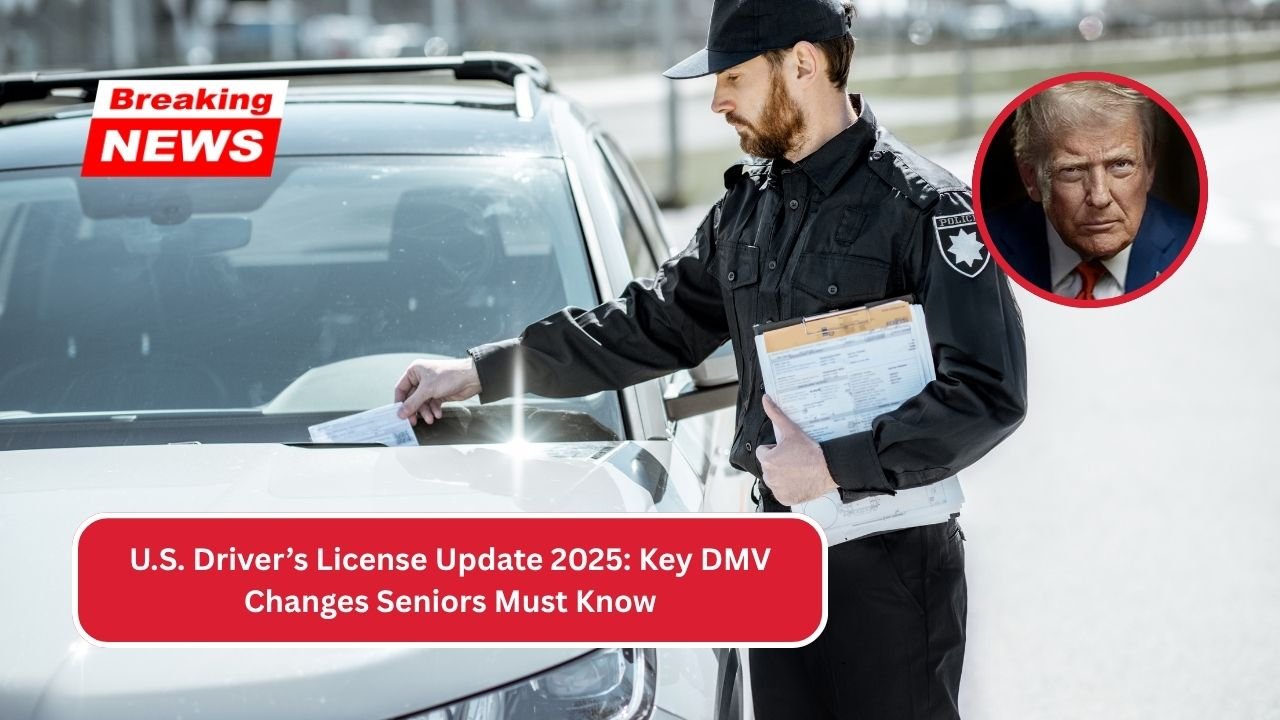The U.S. Department of Motor Vehicles (DMV) introduced new nationwide standards in October 2025, focusing on senior driver safety and public road security. These reforms mark one of the most significant changes in decades, targeting drivers aged 65 and above. While the goal is to make roads safer, the updates also aim to help seniors retain independence through regular monitoring of vision, health, and cognitive ability.
Why the New Renewal Standards Were Introduced
The number of older licensed drivers in America has reached record levels in 2025. With advancing age, issues such as slower reflexes, vision decline, and cognitive challenges have become more common among drivers aged 65 and above. The DMV’s new approach seeks to prevent accidents by ensuring that senior motorists remain medically and visually capable of safe driving. States now follow a unified framework emphasizing early detection of health concerns that could interfere with safe operation of vehicles.
The reforms are not intended to restrict freedom but to balance public safety with the desire of seniors to stay independent and mobile. According to safety data released by several states, sharper screening and regular assessments have already led to fewer age-related traffic incidents.
Mandatory Vision Tests for Drivers Aged 65 and Older
Since October 2025, every driver aged 65 and above must complete a mandatory vision screening at each license renewal. The test measures visual acuity and field of vision to ensure the driver meets state-defined safety thresholds. Many states now require in-person vision assessments carried out either at DMV centers or through approved optometrists.
This step addresses the growing trend of vision impairment among senior drivers, particularly those dealing with cataracts, glaucoma, or age-related macular degeneration. By catching these issues early, the DMV hopes to reduce avoidable crashes linked to vision limitations.
Medical Fitness Certification for Drivers Aged 75 and Above
For drivers aged 75 and older, a new requirement is now in force: submission of a medical fitness certificate issued by a licensed healthcare provider. The report must verify the driver’s physical and cognitive readiness to operate a vehicle safely. The medical evaluation includes assessments of reaction time, memory, physical coordination, and any medications that may affect driving.
If the driver has a condition such as diabetes, heart disease, or neurological disorders, periodic follow-up certifications may also be required. The introduction of this rule reflects a national consensus on the importance of linking medical fitness directly to driving eligibility in the senior age group.
In-Person Renewals Become Standard
Online renewals are convenient, but under the new system, most states now require drivers aged 65 and older to renew their licenses in person. This allows DMV staff to conduct vision or medical checks on-site and ensure compliance with updated standards.
For example, California, Florida, and Texas have started implementing these in-person renewals, while smaller states are preparing similar policies by early 2026. Seniors will need to bring relevant medical certificates and identification documents when visiting the DMV. Appointments are recommended to reduce wait times.
Shorter License Validity Periods Based on Health
Under the new policy, the license validity period for older adults will depend on their health status. Instead of the typical 5-10 year renewal cycles available to younger drivers, seniors may now receive licenses valid for only 1 to 3 years.
This means that individuals with stable health may continue driving without difficulty, while those with chronic medical conditions may be subject to more frequent renewals. The policy ensures that health assessments remain current and reflect the driver’s most recent condition.
Additional Road Tests for Select Seniors
Certain states have also introduced age-triggered driving tests at the time of renewal, particularly for individuals over 80 or for those whose medical reports indicate potential impairments. The driving assessment evaluates reaction times, lane discipline, and situational awareness.
While the idea of additional testing may concern some seniors, DMV data indicates that targeted testing helps maintain safety without broadly limiting older drivers. Many seniors pass these evaluations easily, reaffirming their fitness to drive.
How Seniors Can Prepare for the 2025 Renewal
Preparation plays a key role in meeting the updated DMV requirements. Seniors are advised to schedule eye exams and medical appointments well before the renewal date. Regular check-ups can prevent last-minute disqualifications and catch vision or health issues early enough for treatment.
Each state’s DMV website offers detailed rules and checklists based on age, health condition, and local regulations. Checking these updates before scheduling an appointment ensures a smoother renewal process. Elderly drivers should also consider taking refresher driving courses offered by community centers or nonprofit organizations. These programs provide updated safety tips, new traffic rule reviews, and defensive driving strategies tailored for older motorists.
Benefits of the New DMV Reforms
The 2025 DMV reforms bring several long-term advantages:
- Improved road safety through early identification of health issues.
- Enhanced confidence among senior drivers who continue to meet safety standards.
- Reduced accident rates attributed to visual or cognitive decline.
- Encouragement of regular medical engagement and preventive healthcare.
Public feedback since the rollout indicates growing acceptance, with many seniors recognizing the benefits of these structured assessments. Family members also appreciate the increased clarity about their loved one’s driving capabilities.
Summary of 2025 Senior Driving Requirements
| Requirement | Applies to Age Group | Description |
|---|---|---|
| Vision Screening | 65+ | Mandatory at every renewal for visual safety verification |
| Medical Fitness Report | 75+ | Requires doctor-certified medical evaluation |
| In-Person Renewal | 65+ | Renewal must be completed in person |
| License Validity | Health-based | 1–3 years depending on medical condition |
| Driving Test | Select seniors | Required based on age or health assessment |
As the population ages, the DMV’s 2025 license renewal standards underline a proactive approach to maintaining safety on America’s roads. These updates encourage responsibility, transparency, and self-awareness among senior drivers while ensuring that driving continues to be a safe privilege for all.

